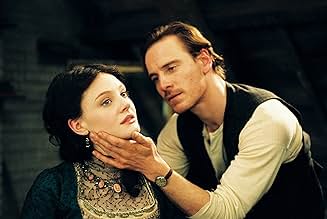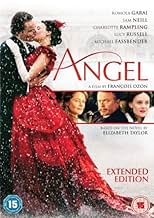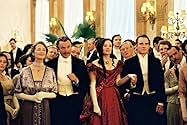IMDb रेटिंग
5.8/10
5.8 हज़ार
आपकी रेटिंग
अपनी भाषा में प्लॉट जोड़ेंThe rise and fall of a young eccentric British writer, in the early 20th century.The rise and fall of a young eccentric British writer, in the early 20th century.The rise and fall of a young eccentric British writer, in the early 20th century.
- पुरस्कार
- 1 जीत और कुल 3 नामांकन
Geoffrey Streatfeild
- Sebastian
- (as Geoffrey Streatfield)
फ़ीचर्ड समीक्षाएं
Angel Deverell (Romola Garai) imagines herself to be a writer. Night after night she writes of her imaginative world. At school, she is ridiculed for her fantasies, and her mother (Jacqueline Tong) has no idea of her talent. A London publisher Theo (Sam Neill), publishes her first book despite her arrogance and his reservations. The novel is a bestseller. She writes another and another and another, and so on.
At the height of her fame, she meets the painter Esmé (Michael Fassbender), and is immediately stuck, even if he is even more arrogant that she is. And, sad to say, more untalented.
This is the key to this film. It is a satire of those stories of the period. There are only two serious people in the film. The rest are caricatures of popular characters and settings.
British writer Elizabeth Taylor's novel, based upon Marie Corelli, a long-forgotten English novelist of the 19th Century, was translated to the screen by François Ozon (Swimming Pool, 8 Women), who also directed. He certainly captured the ego Corelli was reputed to have.
The life she lived or the life she dreamed? That is the question of this film. There is no doubt that for a few brief moments, Angel was never in touch with reality. It makes for great satire.
At the height of her fame, she meets the painter Esmé (Michael Fassbender), and is immediately stuck, even if he is even more arrogant that she is. And, sad to say, more untalented.
This is the key to this film. It is a satire of those stories of the period. There are only two serious people in the film. The rest are caricatures of popular characters and settings.
British writer Elizabeth Taylor's novel, based upon Marie Corelli, a long-forgotten English novelist of the 19th Century, was translated to the screen by François Ozon (Swimming Pool, 8 Women), who also directed. He certainly captured the ego Corelli was reputed to have.
The life she lived or the life she dreamed? That is the question of this film. There is no doubt that for a few brief moments, Angel was never in touch with reality. It makes for great satire.
My advice would be don't waste your time with this film.
Large chunks were clearly meant to be ironic but much was also meant to be more darkly realistic. The result was a wildly veering mish-mash of genres which the director failed to navigate successfully.
Overall, the film felt like a mix between a 1940s melodrama and a 1970s made-for-TV two-part series, with a loathsome central character.
Two people in our group of 20 loved the film, so it must have something going for it. The rest of us were desperate for it to be over from about 20 minutes in. At one point, the main character gets sick, and from behind me and beside me I heard simultaneous mutters of "please die" and "thank god". That was exactly how I felt.
I am sure the film was making all kinds of comments about art, literature, characterization etc etc but it all went sailing over my head. Driving home, I said as much to my flatmate, and he paraphrased Bill Hicks to me: "The film was bad. Don't get suckered into believing it actually saying something complex and clever. It was bad. Leave it at that and walk away".
Large chunks were clearly meant to be ironic but much was also meant to be more darkly realistic. The result was a wildly veering mish-mash of genres which the director failed to navigate successfully.
Overall, the film felt like a mix between a 1940s melodrama and a 1970s made-for-TV two-part series, with a loathsome central character.
Two people in our group of 20 loved the film, so it must have something going for it. The rest of us were desperate for it to be over from about 20 minutes in. At one point, the main character gets sick, and from behind me and beside me I heard simultaneous mutters of "please die" and "thank god". That was exactly how I felt.
I am sure the film was making all kinds of comments about art, literature, characterization etc etc but it all went sailing over my head. Driving home, I said as much to my flatmate, and he paraphrased Bill Hicks to me: "The film was bad. Don't get suckered into believing it actually saying something complex and clever. It was bad. Leave it at that and walk away".
Based on the novel by Elizabeth Taylor, this Francois Ozon directed movie was the closing film of the Berlin Film Festival last year, and while it played out like a biography of a fictional character, you can't help but to imagine how close it seemed to the flamboyance of the other Liz Taylor being infused into the titular character.
Movies based on biographies, such as Miss Potter with Rene Zellweger and La Vie En Rose with Marion Cotillard, seem to follow a formula of rags to riches, and basically living the dream that no one had imagined was possible. Naturally, being blessed with a talent and a gift helps too, and with Angel Deverell (Romola Garai), hers was a steely resolve of wanting to break out of her poverty cycle through her writing, an aspiring novelist with limited life experience, relying solely on her vivid imagination to paint literary marvels with her firm grasp of language, constructing sentences like a wordsmith many times her age.
What made her character compelling to watch and follow, is her living in a fantasy world she constructs for herself, which suits her perfectly as it provides for and fuels her imagination with romantic stories to enchant and endear herself to her readers. It shields her from her insecurities, but in doing so, she slowly isolates herself into her view of Paradise, and becomes a chronic liar, which I felt she's constantly aware of, but is ashamed to admit any stain in the perfect world.
Delivered in two distinct acts, things start to change when she meets the Howe-Nevisons. Nora (Lucy Russell), probably her #1 fan who simply worships the ground she treads on, and offers to be her personal assistant, and her brother Esme (Michael Fassbender from 300 who said they'll fight in the shade!), with whom Angel falls head over heels for. And this stifling relationship takes a toil on all parties involved, with shades of possible lesbianism played down in the film (though I'm unsure what became of it in the novel). While Angel had her break from Theo (Sam Neill) the publisher who believed in her, Esme the aspiring painter has none, besides Angel who would probably say Yes to anything he says. And his portrait of her probably was the highlight for me in the movie. If a portrait painter needs to, and can peer directly into your innermost soul and bring whatever qualities he sees in you onto the canvas, then Esme would have succeeded with his god-ugly picture of Angel, reinforces meaning of being beautiful on the outside. but ugly on the inside.
The special effects were quite badly done, and perhaps deliberately too, as it's made up of very obviously superimposed shots of backgrounds that no longer exist because of modernization. Other than that, the rest of the production values are high, and the costumes too which Angel decked herself in, are quite a sight to behold, especially when there's a call for a change in colours to reflect the mood of the story as it wore on.
But what made this movie very palatable, is how Romola Garai carried the role through the story. You can just about believe the very naiveness and devil may care attitude that her Angel brings, however always seemingly able to hide and bury her true feelings deep within herself, and being a master manipulator also helped loads. Like how Charlotte Rampling's character of the publisher's wife reflected, you just can't help but to pity Angel, despite her pomp, flamboyance and hypocrisy.
So if you're interesting in a movie that provides avenue for an intriguing study of a person putting on a very fake mask, then Angel, despite its title, will be the movie for you to examine human traits which are anything but angelic.
Movies based on biographies, such as Miss Potter with Rene Zellweger and La Vie En Rose with Marion Cotillard, seem to follow a formula of rags to riches, and basically living the dream that no one had imagined was possible. Naturally, being blessed with a talent and a gift helps too, and with Angel Deverell (Romola Garai), hers was a steely resolve of wanting to break out of her poverty cycle through her writing, an aspiring novelist with limited life experience, relying solely on her vivid imagination to paint literary marvels with her firm grasp of language, constructing sentences like a wordsmith many times her age.
What made her character compelling to watch and follow, is her living in a fantasy world she constructs for herself, which suits her perfectly as it provides for and fuels her imagination with romantic stories to enchant and endear herself to her readers. It shields her from her insecurities, but in doing so, she slowly isolates herself into her view of Paradise, and becomes a chronic liar, which I felt she's constantly aware of, but is ashamed to admit any stain in the perfect world.
Delivered in two distinct acts, things start to change when she meets the Howe-Nevisons. Nora (Lucy Russell), probably her #1 fan who simply worships the ground she treads on, and offers to be her personal assistant, and her brother Esme (Michael Fassbender from 300 who said they'll fight in the shade!), with whom Angel falls head over heels for. And this stifling relationship takes a toil on all parties involved, with shades of possible lesbianism played down in the film (though I'm unsure what became of it in the novel). While Angel had her break from Theo (Sam Neill) the publisher who believed in her, Esme the aspiring painter has none, besides Angel who would probably say Yes to anything he says. And his portrait of her probably was the highlight for me in the movie. If a portrait painter needs to, and can peer directly into your innermost soul and bring whatever qualities he sees in you onto the canvas, then Esme would have succeeded with his god-ugly picture of Angel, reinforces meaning of being beautiful on the outside. but ugly on the inside.
The special effects were quite badly done, and perhaps deliberately too, as it's made up of very obviously superimposed shots of backgrounds that no longer exist because of modernization. Other than that, the rest of the production values are high, and the costumes too which Angel decked herself in, are quite a sight to behold, especially when there's a call for a change in colours to reflect the mood of the story as it wore on.
But what made this movie very palatable, is how Romola Garai carried the role through the story. You can just about believe the very naiveness and devil may care attitude that her Angel brings, however always seemingly able to hide and bury her true feelings deep within herself, and being a master manipulator also helped loads. Like how Charlotte Rampling's character of the publisher's wife reflected, you just can't help but to pity Angel, despite her pomp, flamboyance and hypocrisy.
So if you're interesting in a movie that provides avenue for an intriguing study of a person putting on a very fake mask, then Angel, despite its title, will be the movie for you to examine human traits which are anything but angelic.
A group of girls march in succession toward their daily lesson, both their step and their outfits similar in fashion, until one girl breaks from the mold and finds herself at the gates of paradise, forced to gaze from afar. The girl is Angel, the title character from French director, Francois Ozon's first venture into English-language film. Don't let the name fool you though; there is nothing remotely angelic about her. She is spoiled, loud and delusional everything you want in a heroine you're supposed to root for and just the kind of person you want to see get everything they desire. Right?
Angel is a writer, not a very good writer but people love her. She refuses to live in the real world in favor of the perfect illusion she believes she has crafted for herself. It all raises many questions about success and talent, sanity and vanity, but no matter how wickedly she is played by Romola Garai, the woman is too wretched to inspire sympathy in the viewer and Ozon does nothing to help.
Ozon's past efforts range in form from ridiculous and satirical to contemplative and tragic. His transition into the realm of period drama is daring considering the smaller size of his previous works but he juggles the elements well. In fact, he balances back and forth between the elaborate costumes, grandiose sets and exaggerated performances so well that it all feels rather plain. Considering how allergic Angel was to the mundane, I don't think she would have been very pleased with this. And trust me, you wouldn't like her mad.
Angel is a writer, not a very good writer but people love her. She refuses to live in the real world in favor of the perfect illusion she believes she has crafted for herself. It all raises many questions about success and talent, sanity and vanity, but no matter how wickedly she is played by Romola Garai, the woman is too wretched to inspire sympathy in the viewer and Ozon does nothing to help.
Ozon's past efforts range in form from ridiculous and satirical to contemplative and tragic. His transition into the realm of period drama is daring considering the smaller size of his previous works but he juggles the elements well. In fact, he balances back and forth between the elaborate costumes, grandiose sets and exaggerated performances so well that it all feels rather plain. Considering how allergic Angel was to the mundane, I don't think she would have been very pleased with this. And trust me, you wouldn't like her mad.
If I had approached this movie as a satire, perhaps it would have been more bearable. Or maybe not. It somewhat feels like a play on 40's-50's movie comedy, but set in the early 1900's. The script (and the acting for that matter) is so flawed, there is no need to even bother going over its flaws. Fassbender clearly lives in the 21st century and Romola is straight out of an overacted tragicomedy play from the 1800's, except she is behaving like a bratty teenager we see on Sweet 16. I hope she was doing it on purpose, otherwise there are no excuses for her annoyance. There is a fine line between funny and annoying. I had to force myself to finish watching this movie just because I am such a huge Fassbender fan. Him, along with Charlotte and Sam, what a waste of talent.
क्या आपको पता है
- ट्रिवियाThe story is inspired by the life of Marie Corelli.
- भाव
Angel Deverell: [from trailer] Everyone told me my dreams were lies. All I wanted was to make it true.
- कनेक्शनReferenced in Une nouvelle amie (2014)
टॉप पसंद
रेटिंग देने के लिए साइन-इन करें और वैयक्तिकृत सुझावों के लिए वॉचलिस्ट करें
- How long is Angel?Alexa द्वारा संचालित
विवरण
बॉक्स ऑफ़िस
- बजट
- €1,49,00,000(अनुमानित)
- दुनिया भर में सकल
- $28,35,903
- चलने की अवधि
- 2 घं 14 मि(134 min)
- रंग
- ध्वनि मिश्रण
- पक्ष अनुपात
- 1.85 : 1
इस पेज में योगदान दें
किसी बदलाव का सुझाव दें या अनुपलब्ध कॉन्टेंट जोड़ें




































